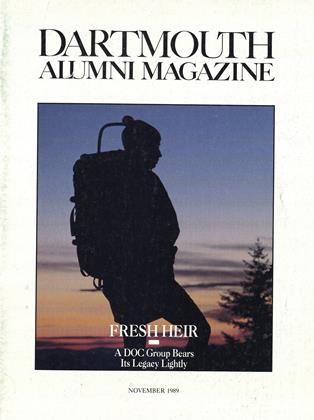How is hiking in the White Mountains like a hunter-gatherer ritual? When the hiking entails an out- door initiation into Dartmouth, the connection may be closer than you think. In both, rituals transform the participants with an effectiveness that is almost magical. Rituals that mark changes in a person's life—what an- thropologists call rites of passage—are both ancient and widespread. Among Africa's Kung hunter-gatherers, for example, men undergo the Rite of the First Kill: after a youth dispatches his first big animal, he receives ritual knife cuts on his body. The rite redefines his position in society: he is now an adult. Girls in many parts of the world undergo rites that center on the first menses. But the rituals do more than merely acknowledge physical maturation. Their very enactment changes the social position of the participant and makes the person into something new.
passage from the world's most exotic societies. There's:
Participants abandon their old lives. Australian Aboriginal boys leave their mothers' hearths and separate themselves from the world of women when they undergo initiation into their society's male religious elite. At Dartmouth, freshmen take leave of their parents and turn to their trip leaders for guidance into the Dartmouth world.
THE LIMINAL STAGE The time when initiates have already left their former status but have not yet achieved their new one. Special clothing or other changes to the body often accompany this in-between stage. Some societies put initiates through a symbolic death to signal that a person's old way of life is over. Freshmen trippies enter liminality the night before they leave; their camping gear is inspected by upper- classmen wearing wild and crazy out- fits. The freshmen remain in liminal limbo for several days. Their appearance becomes increasingly bedraggled. Not being able to shower is symbolic death to many.
THE ORDEAL Many rites of passage require initiates to'step beyond the usual comfortable conditions of their lives, sometimes even to suffer. When freshmen shoulder packs, stretch their muscles and their daring on mountain hikes, battle the rain or cold, lose their bearings, they share the ordeal with the members of their group. Trippies learn to rely on their Dartmouth elders, their fellow classmates, and, just as importantly, on themselves. The or deal gives rise to camaraderie forged of common experience, not necessarily personal affinity. Freshmen bound together by the ordeal resemble what anthropologists call age-mates—indi- viduals who undergo ritual changes of status at the same time. Long after the freshmen trips are over,; many trippies, like age-mates from New Guinea to Amazonia, maintain a special regard for their tripmates, even if they never become close friends.
THE INCORPORATION In many rites of passage, after initiates endure or deals they are taken to a sacred site where they are admitted to the secrets arid rituals of the culture. For Dartmouth freshmen, the mystique of the Ravine Lodge at Mt. Moosilauke awaits them at the end of their trekking ordeals. When trippies get to the Lodge, they have made it to an putpost that is quintessentially Dartmouth. The Lodge functions like an Australian Aboriginal sacred site. It's a place where aspects of Dartmouth culture are handed down from class to class. From Dartmouth songs to the Salty Dog Rag to green eggs and juice at breakfast, from the evening skits to the mesmerizing Doc Benton ghost story, freshmen are ritualized into the culture of Dartmouth.
Freshman trips are not the only rite of passage into Dartmouth society. The College has many rituals that bring students into the community: Convocation, football games, Dartmouth Night, Winter Carnival, Green Key Weekend. Freshman trips simply do the job earlier—and, perhaps, more intensively. By the time the trippies reappear on the Green, most are not the same people they were before.
Faculty Editor Karen Endicott has a master's degree in anthropology from the Australian National University. She and her husband. Dartmouth An thropology Professor Kirk Endicott, are leaving next month for their third extended stay with the Batek, a hunter- gatherer group in Malaysia.
 View Full Issue
View Full Issue
More From This Issue
-
 Cover Story
Cover StoryFresh Heirs
November 1989 By Heather Killerew '89 -
 Feature
FeatureMaking the Normal Less Normal
November 1989 By Warner R. Traynham '57 -
 Feature
FeatureA Foreign Correspondent's Essential Skill: Packing
November 1989 By Christopher S. Wren '57 -
 Feature
FeatureThe Day I Got Chewed Out By Red Blaik
November 1989 By Rodger S. Harrison '39 -
 Feature
FeatureSILENT TOWER
November 1989 -
 Cover Story
Cover StoryA Woodsy Time Line
November 1989
Karen Endicott
-
 Article
ArticleA Professor's Delights
MAY • 1988 By Karen Endicott -
 Cover Story
Cover StoryThen lings get ugly
NOVEMBER 1992 By Karen Endicott -
 Article
ArticleProfessor Faith Dunne:
April 1993 By Karen Endicott -
 Article
ArticleThe Daughters of Eve
October 1993 By Karen Endicott -
 HISTORY
HISTORYShall We Dance?
Sept/Oct 2000 By Karen Endicott -
 History
HistoryCarnival Atmosphere
Jan/Feb 2001 By Karen Endicott








